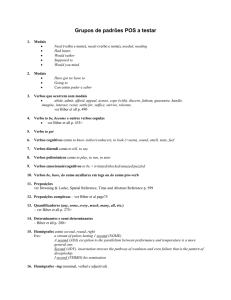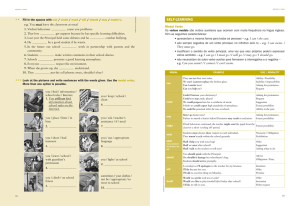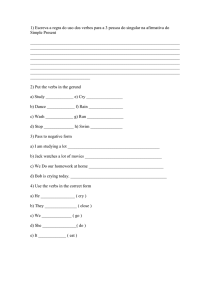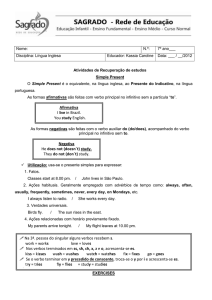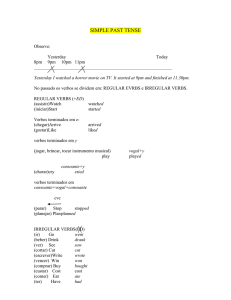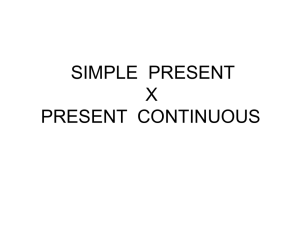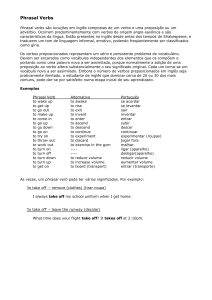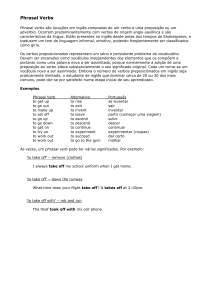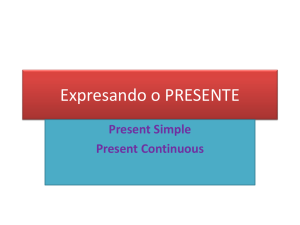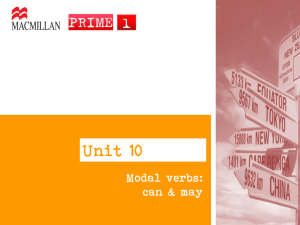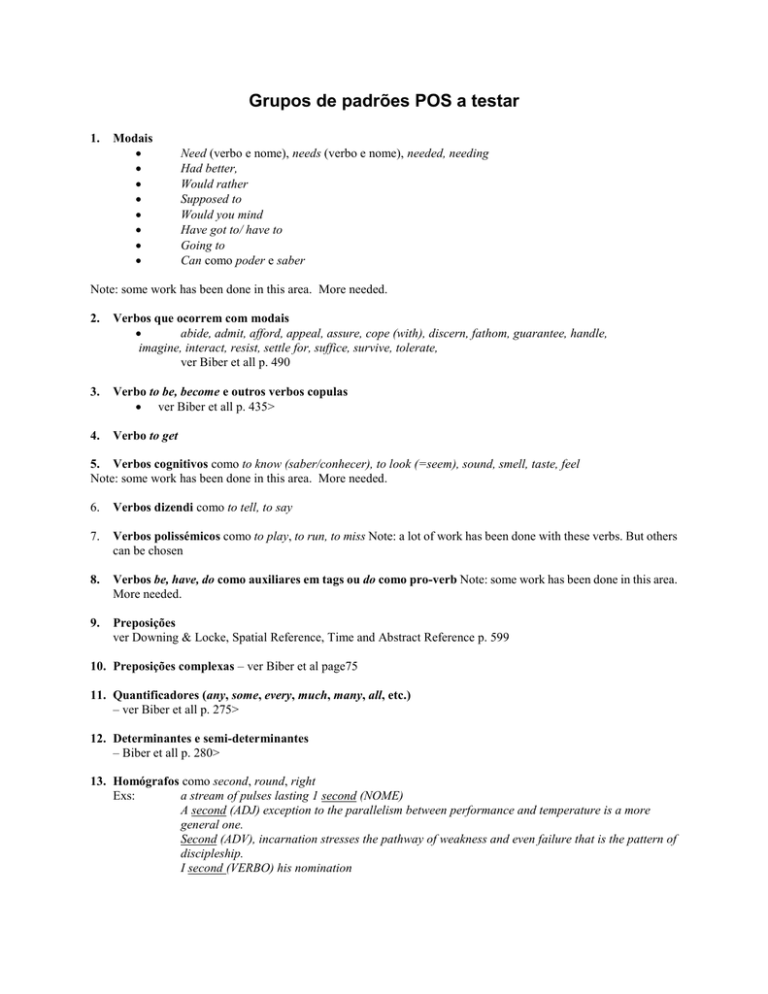
Grupos de padrões POS a testar
1.
Modais
Need (verbo e nome), needs (verbo e nome), needed, needing
Had better,
Would rather
Supposed to
Would you mind
Have got to/ have to
Going to
Can como poder e saber
Note: some work has been done in this area. More needed.
2.
Verbos que ocorrem com modais
abide, admit, afford, appeal, assure, cope (with), discern, fathom, guarantee, handle,
imagine, interact, resist, settle for, suffice, survive, tolerate,
ver Biber et all p. 490
3.
Verbo to be, become e outros verbos copulas
ver Biber et all p. 435>
4.
Verbo to get
5. Verbos cognitivos como to know (saber/conhecer), to look (=seem), sound, smell, taste, feel
Note: some work has been done in this area. More needed.
6.
Verbos dizendi como to tell, to say
7.
Verbos polissémicos como to play, to run, to miss Note: a lot of work has been done with these verbs. But others
can be chosen
8.
Verbos be, have, do como auxiliares em tags ou do como pro-verb Note: some work has been done in this area.
More needed.
9.
Preposições
ver Downing & Locke, Spatial Reference, Time and Abstract Reference p. 599
10. Preposições complexas – ver Biber et al page75
11. Quantificadores (any, some, every, much, many, all, etc.)
– ver Biber et all p. 275>
12. Determinantes e semi-determinantes
– Biber et all p. 280>
13. Homógrafos como second, round, right
Exs:
a stream of pulses lasting 1 second (NOME)
A second (ADJ) exception to the parallelism between performance and temperature is a more
general one.
Second (ADV), incarnation stresses the pathway of weakness and even failure that is the pattern of
discipleship.
I second (VERBO) his nomination
14. Homógrafos –ing (nominal, verbal e adjectival)
in the hope of getting a job building (VERBO) our railway bridge
The building (ADJ) industry has today an appreciably larger number of men at work
it is quite capable of spreading from one building to another
Note: some work has been done in this area. More needed.
15. Homógrafos -ed (verbal e adjectival)
-ED simple past (pretérito perfeito)
The program generated files
–ED past participle (particípio passado)
Family killed in fire
–ED passive (passiva)
The family was killed in the fire.
–ED adjective (adjectivo)
generated item
16. Comparativos e Superlativos (most)
17. Pronomes nas suas diferentes funções: sujeito, objecto, etc.
18. Construções Wh- Note: some work has been done in this area. More needed.
19. There + be, it + (seems) that
20. Nomes no plural (em início de frase)
21. SNs longos com vários adjectivos, etc. Note: some work has been done in this area. More needed.
22. Advérbios ever, often, much, still, yet, already, then e outros
23. Homógrafos advérbio-adjectivo como hard, long, direct, late, clean
ver Downing & Locke, p. 562
24. Homógrafos advérbio-preposição como above, across, abroad, along
ver Downing & Locke, p. 564 Note: some work has been done in this area. More needed.
25. Estruturas V+Vinf
A few new ideas:
Causative processes (See Downing & Locke p. 118, 14.6):
make, render, turn, drive, have - in SVOC structures
Causative with one-participant processes: ergative pairs (See Downing & Locke p. 119-120, 14.7)
burn, boil, burst, change, close, cook, drop, join, melt, move, open, run, shake, shut, stand, stretch, tighten,
turn
One-participant processes: containing a Subject which acts or is acted upon (See Downing &
Locke p.121-122, 15.1)
1) Words like burn, drink, cook, walk, talk turn = verbs (infinitive and present tense) or nouns (singular)
2) Words like drinks, cooks, walk, talks = verbs (present tense - 3rd person sing.) nouns (plural)
Note: they should avoid verbs preceded by 'to' and nouns preceded by articles.
3) -ing forms = progressive form of verb / noun usage / adjective usage
4) -ed forms = past tense / auxiliary + past participle / Past participle with adjectival function / passive
constructions
Prepositional verbs: see: http://www.hio.ft.hanze.nl/thar/grprepv.htm
Phrasal verbs - see: http://owl.english.purdue.edu/handouts/esl/eslphrasal.html and
http://www.eslcafe.com/pv/ and http://valenciaenglish.netfirms.com/phrasals00.htm#List of
phrasal verbs

